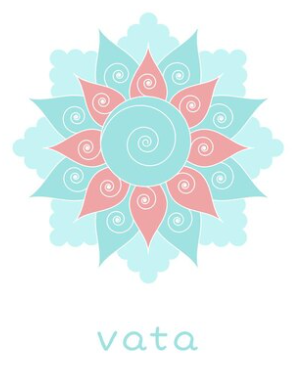Vata governs all movement in the mind and body. It controls the flow of blood, the elimination of waste
products, the act of breathing, and the movement of thoughts in the mind.
Welcome to the second article in the Know Your Prakriti series.
It is considered the leader of the
three doshas (energies or energetic principles in the body) as Pitta and Kapha cannot move or exist
without it. It is therefore imperative that Vata is brought back into balance whenever it is disturbed.

You need to balance the movement of Vata if many of the following conditions are present:
• Your skin or hair is dry, rough and thin.
• You feel cold easily or have poor circulation with cold hands and feet.
• You are chronically underweight and find it difficult to gain weight.
• Your mind is constantly anxious, restless and agitated and you are prone to worry and fear.
• You experience constipation or have frequent flatulence.
• You suffer from insomnia or have unsettled sleep and disturbing dreams.
• You suffer from vaginal dryness or menstrual cramps and PMT.
• You have spells of forgetfulness and absent-mindedness.
• You experience discomfort or stiffness in the joints or lower back pain.
• You easily become fatigued and have poor endurance.
Tips for balancing Vata:
• Follow a Vata balancing diet favouring cooked foods rather than raw foods and salads.
• Go to bed early bedtime and have lots of rest.
• Diffuse calming and grounding aromatic oils or incense into your home and office. Orange,
geranium, lavender, basil, spruce & fir are excellent in this regard.
• Maintain a regular daily routine by integrating the ‘Daily Routine’ (see later section).
• Give yourself an Abhyanga massage using warm sesame oil each morning.
• Ensure you have regular, daily elimination. Triphala herbal formula helps in this regard.
• Stay warm, especially in cold, windy weather.
• Take gentle walks in the countryside to calm and balance the mind.
• Wear calm, soothing colours such as pastels, green or brown.
• Do not overexert and rest whenever the body becomes tired or over stimulated
• Relax often by practising meditation, pranayama, Yoga or Tai Chi.
• Read light, humorous, feel-good novels and turn the television off one hour before bed.
• Take up walking, fishing, bird-watching or gardening for general relaxation.
• Take up writing, drawing, painting or acting to balance your creative energies.
• Avoid excessive talking and try to have a day of silence each week.
• Wrap up warm and keep dry in the winter – cover your head on cold, windy days.
• Avoid loud, noisy environments
• Rest for short periods throughout the day
• Avoid excessive use of VDU displays
The Vata balancing diet
• Favour warm, hearty, nourishing foods with added butter/oil – favour salty, sour and sweet tastes.
• Try and reduce light, dry, cold foods and pungent, bitter and astringent tastes
• Hot, milky, creamy cereals (wheat, oatmeal or rice), soups and stews are all very good for pacifying Vata.
• All dairy products are good (ideally organic and unpasturised) – milk should always be boiled first.
• Oils are good but favour ghee, coconut oil, olive oil, Udo’s oil, flax/pumpkin oil and sesame oil.
• Reduce your intake of light, dry, cold foods such as crackers, nuts, seeds and salads.
• Take nuts and seeds in small quantities only – they are best freshly ground with oil added.
• Reduce the intake of all bean products except tofu, mung beans, mung dhal and red lentils.
• The best grains are rice and wheat but you can take barley, corn, millet, buckwheat, rye and oats in moderation.
• Favour stewed and well ripened, sweet or sour fruits but reduce the intake of dry or light fruits such as apples, pears,
pomegranates, cranberries, and dried fruits (if uncooked). Dried fruits are good if they are cooked after soaking
overnight.
• Sweeteners are good (in moderation), especially jaggary, honey, maple syrup and algarve.
• Vegetables should be cooked and not raw. Peas, green leafy vegetables, broccoli, cauliflower, celery,
zucchini and potatoes are acceptable in moderate quantities if they are cooked, especially with Ghee or oil
and Vata reducing spices but it is best to avoid sprouts and cabbage.
• Hot, nourishing desserts such as apple pie help pacify Vata.
• Eat a substantial breakfast to help improve energy levels throughout the day.
• Herbal teas (camomile, fennel, basil) with a few digestive biscuits are good for Vata energy slumps.
• Avoid stimulants such as coffee and alcohol.
• Sip hot water throughout the day to flush out impurities and balance Vata.
• Warm milk flavoured with ghee, cardamom, cinnamon and nutmeg is excellent before bed.
| Vegetables | Fruits | Herbs/Spices | |||
| FAVOUR | REDUCE | FAVOUR | REDUCE | FAVOUR | REDUCE |
| Asparagus Leeks Artichoke Okra Beetroot Parsnip Olives Corn Butternut squash Green beans Peppers Radishes Carrots Courgettes Cucumber Green beans Leeks Pumpkin Sweet potatoes Turnip | Broccoli Brussels sprouts Cabbage Cauliflower Celery Mushrooms Peas Peppers Tomatoes | Apricots Avocados Bananas Berries Cherries Raisins Pineapple Rhubarb Plums Peaches Oranges Lemons Grapes Kiwi Dates Figs Mangoes Melons Papayas Peaches Plums | Dried fruit Un-ripened fruit Apples Pears Pomegranates Prunes Watermelon | Basil Black pepper Cardamom Cinnamon Clove Cumin Fennel Ginger Liquorice Marjoram Mustard seeds Nutmeg Oregano Sage Thyme | Coriander seed Fenugreek Parsley Saffron Turmeric |
For knowing your body type, please feel free to consult with any Ayurvedacharya (Ayurveda Doctor / Vaidya) on AayushBharat platform. You can download the app from Google Playstore by clicking on the shortlink here: https://bit.ly/3RsJbf3
You can now consult and place an order through WhatsApp:
Consult / Coach: +919828051122
Order Ayush Medicines: +919079985067
Visit our 24×7 online Ayurveda Store: https://aayushbharat.com/shop
Read More: Pitta Dosha | Kapha Dosha | Know Your Prakriti

0 Comments